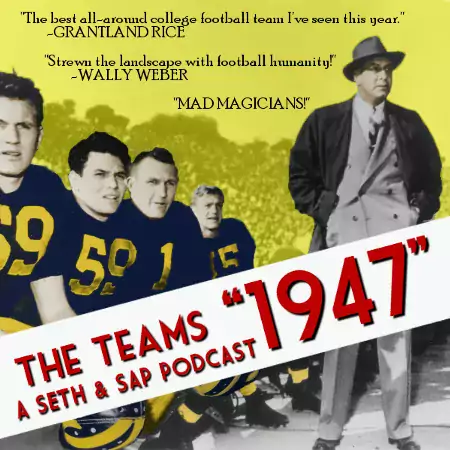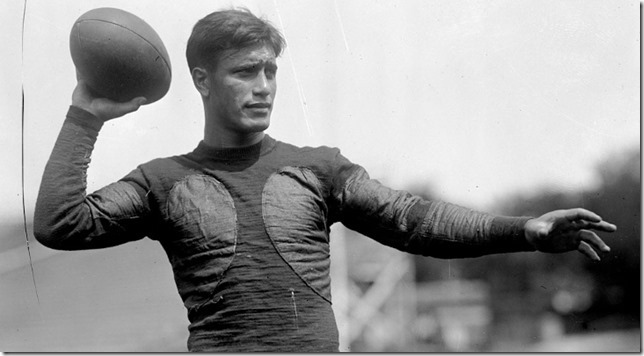bob chappius

2 hours and 2 minutes
Seth and Dr. Sap bring you a podcast about Michigan's greatest teams. This episode: The Mad Magicians of 1947.
Previously: 1980, 1999, 1901, 1964, 1976, 1925
THE SPONSOR:
It is sponsored by HomeSure Lending. If you're buying or refinancing your home, this is the guy to talk to. He'll work on your loan directly and walk you through a process that can get really confusing really fast. I used him. Brian used him. Everyone else who used him is glad they did.
[Description, diagrams, some video after the JUMP]

You know those “make your all-time” lists that circulate in the offseason? Suddenly they got serious.
Previously:
This week: I’ve been leaving out pre-Nineties players because I didn’t gain consciousness until well into the Eighties. We’ll leave the Best of Bo for Sap. These are Pre-Bo. Also this one’s going to be long because a lot of these guys are probably unfamiliar to you.
I did not run any of this past Greg Dooley, who studies this stuff, or the UM Bentley Library guys who curate it, or Craig Ross, who was alive for all of it, and I reserve the right to edit based on anything they might choose to add because they know this stuff way better than I do.
----------------------------------
Rules: Players are considered for how they compared to other players of their own time—a 180-pound center from a Point-a-Minute team wouldn’t survive a series versus one of Woody Hayes’s defensive lines; on the other hand Bump’s players didn’t have to worry about cholera. Pre-platooning players can be eligible for both sides of the ball.
Cutoff Point: To avoid overlap the majority of his playing time had to come before 1969. Just give Bump some credit for recruiting the excellent 1968 class.
Foul Language Warning: The faint at heart might want to skip tight end.
----------------------------------
Quarterback: Benny Friedman

Kinda tough to throw a spiral with that [The Michigan History Project]
Who was Michigan’s greatest quarterback ever debatable, but this much is not: He was certainly Jewish.
I’m going with Benny Friedman over Harry Newman. Friedman was the game’s first great passer, but still more Denard Robinson than Tom Brady. Back in the day freshmen were still not allowed to play varsity, so in 1923 the Glenville (yes, a powerhouse even then) product had to resign himself to embarrassing his classmates. In 1924 Yost was Barry Alvarez-ing over his handpicked successor George Little, and Little refused to put Benny, already a campus legend, on the field. Until, that is, Michigan lost to Red Grange’s Illinois, and a furious Yost joined the campus chorus to play Friedman. The result was immediate and spectacular. After ‘24 Yost sent Little packing, inserted Friedman as his starting QB, and in concert with a certain future Michigan head coach, outscored opponents 227 to 3*. The following year they lost only to eventual national champion Navy (a team Benny and Bennie handled 54-0 at home in ‘25). Friedman also kicked every field goal and extra point, led the team in rushing, returned a kickoff 85 yards, threw more TD passes than the rest of the Big Ten combined, and called every play.
* [As luck would have it the 3 went to Northwestern in a ridiculous 3-2 mudfest that got the safety rule changed and nearly got Evanston burned to the ground; Craig Ross wrote about it in HTTV 2015.]
Honorable Mention: Harry Newman, who went 24-1-2 as a starter and should be counted among Heisman winners except they called it the Fairbanks Trophy back then. Big Bob Timberlake
[After THE JUMP: Icons and Legends]
Highlights from 1948 Rose Bowl
Every five years or so, a group of old Michigan players from mid-1940s would gather to share old stories and relive the camaraderie of one of the closest teams to ever put on the winged helmet. The team featured the All-American backfield duo of Bob Chappuis and Bump Elliott, not to mention Howard Yerges, Bob Mann, and future All-Americans Alvin Wistert, Pete Elliott, Dick Rifenburg, and Robert Wahl. But when you ask the history guys who really made that team go, their answer is always the same guy, and not one of the above. He was also, coincidentally, the guy organizing the reunions.
As they last met in 2008, 2013 was supposed to be the next such get-together. Some of the guys are still out on the golf course, but the years have dealt the losses to these men that their 1946-'49 opponents never could, and of those that remain to us, too few can responsibly make the journey for a 2013 reunion. So we'll have it here instead, as MGoBlog had the opportunity to interview the man at the heart of one of Michigan's all-time greatest teams, spinning fullback Jack Weisenburger.
Last week I had the opportunity to spend a short time speaking with Jack on the phone about his time at Michigan, from his recruitment to the changes he witnessed in wartime, to the team. His story and theirs, after the jump.

7